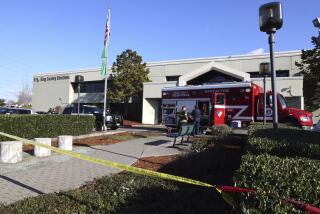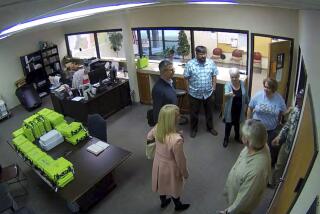Why did FBI militia informant have a foot in Alaska politics?
SEATTLE -- Now that the mole who helped bring down the leadership of the Alaska Peacemaker Militia has talked publicly, the big question on some minds in Alaska is: Why was federal FBI informant William Fulton involved in political campaigns?
The controversy has erupted over the past few days, as it emerged that Fulton, an Anchorage military surplus store owner who helped gather evidence against militia leader Schaeffer Cox, had helped manage the unsuccessful campaign of right-wing former radio host Eddie Burke for lieutenant governor in 2010. He also provided a controversial security detail for U.S. Senate candidate Joe Miller that year -- all while penetrating Alaska’s far-right fringes as part of the Cox investigation.
Fulton, who has since left Alaska to avoid the chance of reprisals stemming from his FBI work, insists that federal law enforcement agents had no involvement in his political activity and in fact were uncomfortable when they learned of it.
“They had absolutely nothing ever to do with anything like that,” Fulton told the Los Angeles Times on Monday. “The only thing that they ever asked me to do was to look into Schaeffer Cox and a few other people. The only thing they said [about the political activities] was, ‘Hmm, Bill, maybe you shouldn’t be doing this.”
The issue has caused a brouhaha of sorts in Alaska, with the Alaska Dispatch asking, “Should the FBI have kept a tighter leash on its militia mole?”
The controversy is tied in large part to Fulton’s work on a security detail for a campaign event for Miller, who was running on a tea party platform.
The event proved disastrous when Fulton handcuffed and detained a man who had aggressively followed the candidate in an attempt to ask questions. The man -- whom Fulton said he didn’t know -- refused several orders to leave. As it turned out, the man was a reporter and editor for the Alaska Dispatch, and the specter of a beefy security guard handcuffing a journalist undermined Miller’s campaign.
Although Miller won the Republican primary against the relatively moderate U.S. Sen. Lisa Murkowski, she launched an unprecedented write-in campaign and beat him in the general election.
The widely reported arrest of a journalist at a town hall meeting “absolutely” was detrimental to his campaign, Miller said Monday in an interview with The Times.
“I’m a strong supporter of the 1st Amendment, and I had close friends that had been supporters of my campaign question, ‘Why would Joe Miller handcuff a journalist?’ For crying out loud, I wasn’t even in the building,” Miller said. “It was utilized as a political weapon against us in the state.”
Miller said he is now troubled that Fulton, whose personal politics turn out to be not at all aligned with the far right, was injecting controversy into his campaign and was also working on the campaign of Burke, another right-wing candidate who lost -- all during 2010, when he was a paid informant for the FBI.
Miller recalled the well-publicized election of 2008, when longtime U.S. Sen. Ted Stevens lost his bid for reelection after being convicted of failing to report gifts from an oil industry lobbyist at the end of a long investigation waged by the FBI in Anchorage. The charges were dismissed in 2009 on the U.S. Justice Department’s own motion when it was learned that potentially exculpatory evidence had not been turned over to the defense. But by then, Democrat Mark Begich had won Stevens’ seat.
“This is the second U.S. Senate race in Alaska that the FBI has had some involvement in,” Miller said. “I’m certainly not expressing any type of conspiracy theory about the FBI causing any kind of trouble to my campaign, but it’s conceptually troubling to me that you have a paid informant working on multiple campaigns answering to the FBI, being debriefed by the FBI, and I really think it’s incumbent on that agency to come clean about the scope of this individual’s employment and the level of involvement the FBI had in that.”
Sandra Klein, who was Fulton’s handler for the FBI, has said his role was purely to meet with Cox and his associates in connection with their illegal attempts to collect guns, silencers, grenades and explosives and to plan the killings of judges, police and other government employees.
Klein told The Times that she knew Fulton had met Cox in a meeting with Miller at a political function in 2008, but said she never really discussed politics with him.
“Whatever he did on that part with Joe Miller was not anywhere in our purview that we were interested in,” she said.
In a later email, she emphasized: “The bureau had absolutely no role in Fulton’s business dealings or his relationships with his clients. Simply stated, any actions undertaken by Fulton on behalf of his clients were between Fulton and his clients. The bureau gave Fulton no directions as to how he should conduct his business or clients.”
Fulton said that although he considers himself socially liberal and economically conservative, he volunteered to work for right-wing political causes because it was an asset to his military surplus and security business, which attracted a right-wing clientele.
He said he agreed to provide security for Miller’s town hall event as part of his business, which typically provided security to concerts and other events.
“One of his [Miller’s] staffers called me, said, ‘We need some security,’ I said, ‘OK, he’s a U.S. Senate candidate, I’ll go and I’ll take two of my better guys with me,” he said.
As for the confrontation with journalist Tony Hopfinger, Fulton said: “We were doing standard security. This guy runs up to him, and by the way he had no credentialing, we had no idea who this guy was. He had something in his hand and he was like running up to the candidate. We of course get between him and the candidate because that’s our job.”
“After that happened five or six times … we decided to arrest him,” he said. “We did the same thing we’d done a million times… Just like if we have a concert and we have to arrest someone if they won’t leave, same deal. Regardless of what my political views are or were at the time, we did our job.”
Fulton said it did cross his mind after the fact that the very public confrontation with the journalist “was actually good for us operationally,” in terms of the FBI investigation.
“It let [Cox and his associates] think we were even more right-wing nuts than they thought.”
As for Burke, Fulton said he agreed to help run his campaign because the former radio host had frequently promoted his military surplus shop on his program. “Then when he became a candidate for lieutenant governor, of course, he brought those listeners with him, which were of interest as customers,” he said.
Burke said he had no idea when Fulton was working on his campaign that he was also working for the FBI.
“I’m a little disappointed that he didn’t say something to me up front about it,” he told The Times. “But then again, I understand the situation he was in, working with the FBI, trying to do the right thing, and not being able to tell people about it.”
He said he “almost fell out of my chair” when he learned that Fulton, whom he knew to be a friend of Alaska’s right-wing Republicans, had actually voted for President Obama.
“I never would have expected Bill Fulton to vote for a liberal, and I think I know Bill pretty damn well,” he said.
At the same time, he said, he credits Fulton with warning him away from Cox, whom he had known before mounting his lieutenant gubernatorial campaign.
“I already knew Schaeffer was a little bit out there,” Burke said. “But Bill looked at me, I’ll never forget it. He said, ‘Eddie, you stay away from Schaeffer Cox.’ And I said I know, and he said, ‘No, I’m telling you, you need to stay away from Schaeffer Cox.’ And I go, ‘Oh, OK.’ And I just left it at that. But I’ll never forget that. And now in hindsight, it all makes sense.”
ALSO:
Sandy Hook group calls for ‘real change’
Trial begins in Oregon Christmas-tree bomb plot
Hacktivist’s death intensifies criticism of U.S. attorney, MIT
More to Read
Sign up for Essential California
The most important California stories and recommendations in your inbox every morning.
You may occasionally receive promotional content from the Los Angeles Times.










